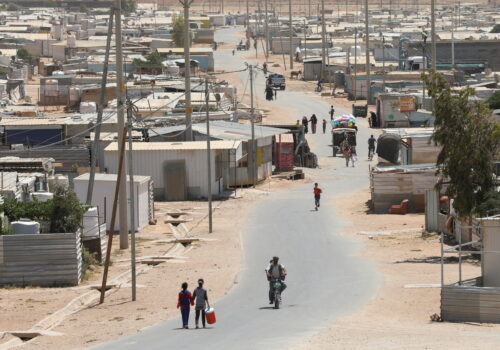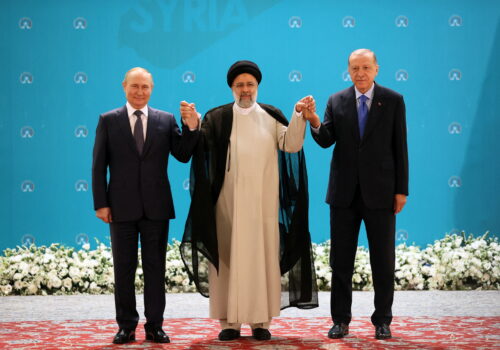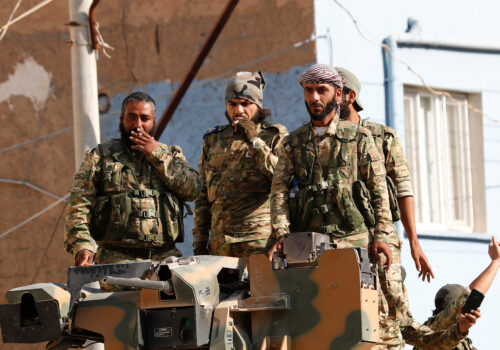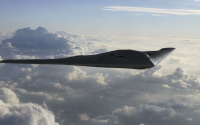Turkey is searching for a way out of Syria’s impasse
Turkey’s Syria strategy is at a critical juncture. Facing military deadlock, Russian resistance, and US economic pressure, Ankara is considering political avenues, potentially reshaping its Kurdish policy.
Turkey is navigating multiple opposing strategies at once, from engaging with Damascus to eliminate the YPG-dominated Syrian Democratic Forces (SDF) in Syria to allowing the imprisoned leader of the Kurdistan Workers’ Party (PKK), Abdullah Ocalan, to speak in the Turkish parliament and declare the end of the organization—which the United States, NATO, the European Union, and Turkey have designated as foreign terrorist organization.
By doing so, Ankara is hoping to find a resolution. As the PKK’s center of gravity has shifted from Iraq and Turkey to Syria, Turkey’s military and political gains in Iraq alone have not been enough. The escalating tensions in the Middle East have also intensified Turkey’s search for a viable solution.
Russian and American obstruction of Turkish military operations
Since 2015, Turkey’s focus in Syria has been securing its borders from PKK-affiliated People’s Defense Units (YPG) forces within the US-allied SDF. Turkey’s 2016-2019 military operations aimed to establish a safe zone free of YPG influence.
SIGN UP FOR THIS WEEK IN THE MIDEAST NEWSLETTER
In 2019, when then-President Donald Trump announced a partial withdrawal from Syria, the SDF signed an agreement with Damascus, facilitated by Russia. Under this deal, Moscow and Damascus committed to deploying troops to protect the SDF from attacks by the Turkish Armed Forces and the Syrian National Army. Since then, Turkey has attempted several cross-border operations against the YPG-dominated SDF. However, Russia has effectively blocked these attempts by applying diplomatic and military pressure to deter Ankara.
In recent weeks, in response to rumors of a Turkish military operation, Russia bolstered its troops east of the eastern Euphrates River. The Russian-backed 25th Division, also known as the Tiger Forces, sent troops to YPG-controlled regions, along with Iranian-backed Shia militias. Additionally, Russian airplanes and helicopters have been patrolling regions with a Turkish military presence, demonstrating Russia’s air superiority in Syria. Similarly, Russia has reacted to rumors of military operations by Hayat Tahrir al-Sham (HTS), a designated terror organization.
Turkey’s situation is further complicated by the stance of the United States, which has consistently opposed Turkish military actions in Syria aimed at the SDF. The United States supports the SDF as a partner in counterterrorism efforts against the Islamic State of Iraq and al-Sham (ISIS), putting Turkey at odds with American interests in the region. To deter Turkish operations, the United States has threatened economic sanctions against Turkey. Turkey’s strained economy heightens its aversion to US sanctions, adding pressure to avoid conflicts over the SDF.
Failed dialogue attempt with Bashar al-Assad
Turkey has been at a standstill, which, combined with domestic political considerations, led to a reevaluation of its strategy. In 2023, following negotiations between Turkish President Recep Tayyip Erdogan and Russian President Vladimir Putin, Turkey and Syria’s defense and foreign ministers met with their Iranian and Russian counterparts. However, this meeting did not yield any significant progress.
After a year of silence, Erdogan reasserted his willingness to dialogue with Bashar al-Assad. This year, he publicly requested that Putin facilitate a meeting with the Syrian president, indicating Turkey’s acknowledgment that cooperation with Damascus might be necessary to achieve its goals in Syria. Despite several overtures from Erdogan, a meeting between Ankara and Damascus did not occur.
Turkey’s willingness to engage in dialogue with Assad signifies a significant shift from its previous approach. In theory, this cooperation could enable Ankara and Damascus to implement coordinated security measures against the YPG-dominated SDF, addressing one of Turkey’s primary security concerns. However, this path is fraught with challenges, as Assad’s policy objectives and priorities do not align with those of Turkey.
Turkey also fears a US-backed Kurdish state on its border, what Turkish officials refer to as “Terroristan.” Unlike the Kurdistan Region of Iraq, a PKK-led entity in Syria poses a direct threat to Turkey as it would have direct spillover effects on Turkey and could empower separatism and violence within the country.
Ankara’s concerns are heightened by the potential for a larger regional conflict involving Israel and Iran. As tensions rise, Turkey is acutely aware that an all-out war could spread into Syria, destabilizing the northern region and creating new security challenges at its borders. Ankara fears that Israel may collaborate with the YPG to counterbalance Iran in Syria, potentially providing political or covert support that would undermine Turkey’s position in the region.
A significant concern for Turkey is the potential for an Israeli ground invasion of Lebanon, which could lead to a humanitarian crisis and mass displacement. If hostilities escalate to this level, Syria is likely to see a surge of refugees fleeing the violence, many of whom would head toward the Turkish border. Turkey already hosts millions of Syrians.
A new strategy to address the Kurdish issue?
In a surprising development, on October 22, Devlet Bahceli, the leader of the Nationalist Movement Party (MHP) and a key ally of President Erdogan, recently suggested that Abdullah Ocalan, the imprisoned leader of the PKK, could potentially address the Turkish parliament if he agreed to call for an end to the PKK’s armed struggle. This proposal represents an unconventional and possibly unprecedented approach to Turkey’s Kurdish issue, which Ankara might use as leverage in its efforts to resolve the ongoing situation in Syria.
Following Bahceli’s suggestion, Ocalan’s family visited him in prison the day after Bahceli’s call. During this visit, Ocalan conveyed that he has the “theoretical and practical power” to transition the Kurdish issue from an armed struggle to a political and judicial approach. Meanwhile, a PKK attack against a Turkish defense company triggered Turkish retaliations on PKK and YPG sites in Syria and Iraq.
Bahceli’s comments were met with silence from Erdogan for a week. This is noteworthy, especially since Turkish journalists accompanying him on his BRICS summit visit to Russia asked various questions but avoided the most important topic. Some figures within the Justice and Development Party claimed that Erdogan was unaware of the comments made by Bahceli. Eventually, on October 30, Erdogan thanked Bahceli, asked people to react to his suggestion “without prejudice,” and reaffirmed that there is no outreach for “terrorists in Iraq and northern Syria,” which was a reference to the PKK and its Syrian branch.
Nevertheless, this new initiative may lead nowhere, as exemplified after the BRICS summit when Erdogan renewed his call for cooperation with Damascus and requested that Putin mediate.
Even if the new process proceeds, it remains uncertain how any new process involving the PKK and its Syrian branch would be implemented. It’s unclear if such a process would be sustainable and how much influence Ocalan would have over them. The last attempt at a peace process between Turkey and the PKK ended disastrously and resulted in hundreds of deaths, along with an increase in violence and terror. The current geopolitical landscape is not supportive of a new process. Additionally, various potential obstacles could derail the process, even if there is a genuine willingness to achieve peace.
However, the United States has a strategic opening with Turkey as both nations search for a way out of Syria. With aligned interests, their cooperation could ease regional tensions. Considering the unknowns, uncertainties, and significant risks, the United States should ensure it is not seen as part of the process and should remain impartial. Even the sincerest US involvement could harm bilateral relations. The Turkish-American dialogue should be done in parallel without any links to what Turkey does with the PKK and Ocalan.
Ömer Özkizilcik is a nonresident fellow for the Syria Project in the Atlantic Council’s Middle East Programs.
Further reading
Thu, Sep 26, 2024
Member states can and should refer the situation of Syria to the ICC
MENASource By Yaser Tabbara and Nick Leddy
Until a few years ago, Syria’s pathway to the ICC was closed. But in 2018 and 2019, two historic ICC decisions re-opened the door for Syria’s situation.
Thu, May 9, 2024
Syria holds the key to improved US-Turkey ties
MENASource By Ömer Özkizilcik
It is crucial that the United States and Turkey overcome their differences because the governments need to strengthen their alliance—especially as it concerns Syria.
Tue, Jun 18, 2024
From rebel factions to an army: Efforts to tame the Syrian National Army
MENASource By Levent Kemal
The ultimate goal of reforming the SNA is to create space for a self-sufficient political actor that organizes public policies.
Image: A Turkey-backed Syrian rebel fighter walks next to a wall where is depicted the jailed Kurdistan Workers Party (PKK) leader Abdullah Ocalan, in the border town of Tal Abyad, Syria, October 17, 2019. REUTERS/Khalil Ashawi




